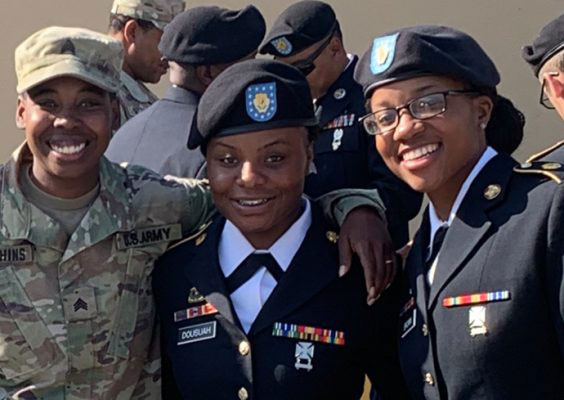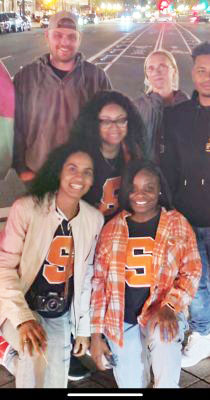
U.S. Army veteran Benetta Dousuah G’25, currently a graduate student in the Falk College of Sport and Human Dynamics, vividly recalls her family’s escape from Liberia during the back-to-back civil wars that ravaged the nation between 1989 and 2003. Initially seeking refuge in a camp in Ghana, it took almost a decade before they secured the opportunity to immigrate to the United States.
In reflecting on her resettlement experience, Dousuah expresses deep gratitude for the social workers who played a pivotal role in providing stability for her family, especially considering Liberia’s dire circumstances during the 2014 West Africa Ebola Virus outbreak, the worst in recorded history. In the remote villages scattered throughout West Africa, young women are often an indicator of viral outbreaks since they often serve as caretakers in their rural communities.
The enduring memories of U.S. Army soldiers providing humanitarian aid in her homeland influenced Dousuah’s decision to enlist in the military. While she was initially drawn by the educational benefits like the post-9/11 GI Bill, her desire to give back and assist those in need also significantly influenced her choice.
“After we came here from Liberia, I remember seeing soldiers helping out on the news. At the time it spoke to me, and I wanted to reciprocate that same energy, so I chose to enlist in the Army,” says Dousuah.
Dousuah served as a unit supply specialist, a crucial role in the logistical backbone supporting the U.S. military’s global presence. The military’s logistical units often play a vital role in humanitarian operations, particularly in remote areas with limited infrastructure.

In 2014, the U.S. Army responded to the Ebola outbreak in Liberia by constructing specialty field hospitals and providing essential medical services throughout the region. By 2021, Dousuah, now a Sergeant in the U.S. Army and a mother to a young daughter, found herself offering the same kind of assistance to refugees that her family was shown when they fled Liberia
“We were deployed to Indiana to help with the Afghan refugee resettlement process,” says Dousuah, who identified parallels between her experiences coming to the U.S. and the Afghan families she assisted. In addition to her regular duties, she contributed to developing classes for children and volunteered as a teacher. This direct involvement inspired a long-term goal of establishing a school in Liberia.
“I plan on going back to Liberia after graduate school just to get the idea of what I need to do first, but ultimately I want to get the foundation going to try and build, and then open, a school there,” says Dousuah.
As an Army veteran, Dousuah is committed to supporting service members and veterans dealing with mental health challenges. Her motivation stems from personal experiences working with soldiers struggling to access adequate behavioral health services and recognizing the insufficient support for Black women in particular.

“Our mental health is not taken as seriously as it should be. If I’m experiencing social anxiety I may not be comfortable in the situation, but that’s not how people see it,” says Dousuah. “They just label us as angry, and it puts a lot of pressure on us when it comes to our mental health.”
According to the U.S. Department of Health and Human Services, women veterans aged 26 or older are among the most vulnerable members of the veteran population when it comes to suffering major depressive episodes. Dousuah sees her studies as a way to integrate both goals.
“While my concentration is on the clinical side of social work, I’ve also been able to take AIP (Advanced Integrated Practice) classes, which are more policy-related in a way,” says Dousuah. “My classes are helping me implement what I’m learning into the idea of building the school.”
Dousuah also seized an opportunity to assist her fellow veterans by interning with the College of Law at the Betty and Michael D. Wohl Veterans Legal Clinic.
“The work that I do in my internship is compelling because I get to help other veterans, particularly veterans like me or going through things I’ve been through. It’s helped me understand the whole holistic aspect of connecting veterans to resources, some of which I knew nothing about before,” says Dousuah.
To learn more about military-connected students at Syracuse University, or the programs and services available to them, please visit the Office of Veteran and Military Affairs website.
An SU News story by Charlie Poag originally published on Feb. 26, 2024.
